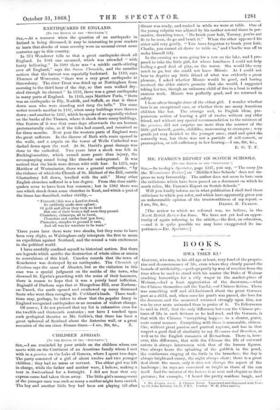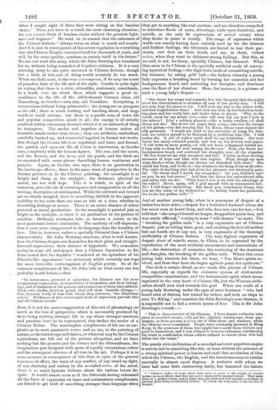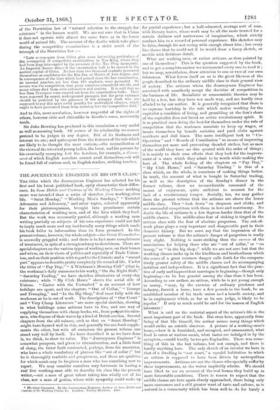BOOKS.
111VA TSIEN KI.*
G01:7111E, who was, in his old age at least, very fond of the proprie- ties and decorousnesses of life, even where they clearly passed the bounds of artificiality,—perhaps partly by way of reaction from the time when he used to stand with his master the Duke of 1Veimar cracking horsewhips for a silly wager in the market-place of Weintar,—had a keen appreciation of the decorums,—what the Chinese themselves call the Tao Li,—of Chinese fiction. There was something stiff and old-fashioned about the great German poet as a child, and, when once his youth was passed, the love for the decorous and the measured returned strongly upon him, nor was he ever more animated than in praise of it. To Eckerinnun he said in 1827, that the only difference between the Chinese pic- tures of life in such fictions as he had read, and the German, is that with the Chinese "everything hlappiul in a clearer, purer, more moral manner. Everything with them is reasonable, citizen- like, without great passion and poetical rapture, and has ill that respect a good deal of similarity to my Hermann and Dorothea, as well as to the English romances of Richardson. There is, how- ever, this difference, that with the Chinese the life of outward nature is always interwoven with that of the human figures. 011C always hears the splashing of the goldfish in the pond, the continuous singing of the birds in the branches ; the day is always bright and sunny, the night always clear ; there is a great deal about the moon, only it does nut change the aspect of the landscape ; its rays are conceived as bright as those of the sun itself. And the interior of the houses is as neat and elegant as their pictures; for example, ' I heard the pretty maidens laugh, and • The Ilveeery &eon. A Chinese Novel. Translated and Illustrated with Notes by Sir John BowrinF, LL.D., F.E.S. London: W. U. Allen and Cu.
when I caught sight of them they were sitting on fine bamboo chairs.' There you have in a touch the most charming situation ; for you cannot think of bamboo chairs without the greatest light- ness and elegance." He went on to remark that the substance of the Chinese fictions "always turns on what is moral and seemly. And it is just in consequence of this severe regulation in everything that the Chinese Empire sustained itself for thousands of years, and will, by the same quality, continue to sustain itself in the future." No one can read this story, which Sir John Bowring has translated for us, without being reminded of Goethe's criticism. It is a very amusing story to one quite unversed in Chinese fictions, though
but a little of this sort of thing would certainly be too much. What one feels most, is the tame extravagance, if we may use a sort of paradox, both of the life and of the style. Goethe is quite right in saying that there is a civic, citizenlike, customary, considerate, in a word, tame air about them which suggests a great re- semblance to the life of the old-fashionad German cities, old
Nuremberg, or Goethe's own city, old Frankfort. Everything is ceremonious without being aristocratic ; the young are as pompous as the old ; there is much bowing and handing about, and large words to small actions ; but there is a pacific tone of town life and popular competition about it all ; the energy is all strictly confined within customary channels which it is an unheard-of thing to transgress. The modes and impulses of human action all resemble canals rather than rivers ; they are artificial, methodical, carefully banked up, and connected together in formal net-works. But though the human life is so regulated, and tame, and formal, the garden and open-air life of China is interwoven, as Goethe says, completely with the human figures. The sun, and the moon, and the flowers, and the trees, and the ponds, and the birds are incorporated with every phrase describing human sentiment and purpose. Again, as Goethe also says, there is no graduation in the landscape effects ; there is the same want of perspective in the literary pictures as in the Chinese painting ; the moonlight is as bright and sharp as the sunlight ; the distances, physical or moral, are not well kept. This it is which, in spite of the tameness, gives the air of extravagance and exaggeration to all the writing, descriptive or sentimental. While the outward and inward are so closely mingled, there is something childish in the apparent inability to use more than one tone or tint at a time, whether in describing feelings or scenes. There is an entire absence of either pictorial or moral graduation. As the moonlight is painted just as bright as the sunlight, so there is no graduation in the picture of emotion. Ordinary courtesies take as intense a colour as the most passionate lovers' sentiments. The modesty of self-deprecia- tion is even more exaggerated in its language than the humility of love. This is, however, rather a specially Oriental than a Chinese characteristic. Sir John Bowring mentions, what is well known, how the Chinese despise our despatches for their plain and straight- forward expressions, their absence of hyperbole. We remember seeing in some old newspaper that a Chinese deputation to Sir John stated that the deputies "wondered at the splendour of his Phomix-like appearance,"—a statement which certainly out-tops the most lover-like extravagances of English poetry. So of the common compliments of life, Sir John tells us what every one has probably heard before,—that
"In intercourse, personal or epistolary, the Chinese use the most exaggerated expressions, in deprecation of themselves and their belong- ings, and of laudation of the persons and possessions of those they address. Their own abodes, however grand, they call their humble cottage,'— that., however lowly of him with whom they converse, the illustrious palace.' Evidences of this extravagant form of expression pervade this and all Chinese novels."
Now, it is not the mere exaggeration of this sort of phraseology, so much as the loss of perspective which is necessarily produced by
there being nothing stronger left to say where stronger emotions and passions have to be represented, that strikes the reader of a Chinese fiction. The meaningless compliments of life are as em- phatic as its most passionate vows; and so, too, in the painting of nature, as the buttercups and daisies, or whatever maybe the Chinese equivalents, are left out of the picture altogether, and we have nothing but the peonies and the lotuses and the chloranthuses, the imagination gets fatigued with spots of equally ostentatious colour and the consequent absence of all tone in the art. Perhaps it is in some measure in consequence of this that, in spite of the general tameness of effect, the want of any conflict, of any stand-up fight, of any elasticity and variety in the so-called action of the novel, there is so much hysteric violence about the various lovers' de spair. It would almost seem as if the Orientals having exhausted
all the force of expression on tame and ceremonious compliments, are forced to get hold of something stronger than language when they get to anything like real emotion; and are therefore compelled to introduce floods of tears, shiverings, raids upon furniture, and suicide, as the only fit expressions of actual misery when
they desire to paint it 'vividly. The range of expression which words can convey having been entirely used up for the faintest and feeblest feelings, the Orientals are forced to tear their gar- ments, cast dust on their heads, and use, in short, violent action, when they want to delineate strong feelings. But this, as we said, is not, we fancy, specially Chinese, but Oriental. What does seem to be Chinese is the specially artificial mode of convey- ing hysterical feeling,—the high-born mode of committing suicide, for instance, by eating gold leaf,—the fashion whereby a young lady expresses a breaking heart by burning her cosmetics and her backgammon board, and scattering her draughts and dominoes
over the floor of her chamber. Here, for instance, is a picture of such a young lady's despair :—
" She threw her rouge and cosmetic box into the pond, that she might show her determination to abandon all care of her pretty face. I will not even hope for peace or joy. I will seek my way to the yellow wells, and find forgetfulness there.' And then she took up her luxurious look- ing-glass and her costly lute and broke them in pieces. Who, in the world, cares for my music, now,—who will over ask me how I look in the mirror? Like a solitary pliconix,—like a lonely swallow,—I shall droop and die.' She threw her jasper flute away,—she tore the strings of her guitar,—but fell weeping like Yu Kwan, whose tears stained her silk garments. would not yield to the entreaties of Lung Ye, him-- self, nor subject myself to be betrayed by a perfidious Liao Chi. I will rather die. A pile of yellow earth shall ho my habitation.' She next burnt her many-coloured pencils, and tore up her flowery note-paper. ' I will write no more poetry,—I will not leave a fragment behind me. I long only to sleep for ever among the flowers.' Next, she burnt her backgammon board, and scattered her draughts over all the chamber. 'He has deceived me with treachery and lies ! I think on these fleeting moments of hope and bliss with vain regrets. What, though my eyes weep blood,—what, though any sleeves are drenched with tears !' She seized her harp, and broke it,—her dominoes she flung about on all sides. The sight of anything that had given her pleasure was intolerably pain- ful. 'On whom shall I wreak any vengeance ? On you, faithless one ! on you, be my last curses!' And then she threw her embroidered silks and satins into the fire. • What have I now to do with the adornings of the toilet? Never, again, will I gird myself with an ornamented belt. No! I will forget everything. But know you, treacherous Liang, that you are the clause of my destruction.' So, having burnt her garments, she broke her golden nails." *
And of another young lady, when in a paroxysm of despair of a rather less keen order,—despair for a betrothed husband whom she has never seen or heard from, and who does not care for her,—it is told that "she rouged herself no longer, dropped her paint-box, and was sorely afflicted," vowing to wear "silk dresses" no more. The " breaking the golden nails" is a very expressive act of Chinese despair, just as letting them grow, and crushing the feet till neither feet nor hands are of any use, is very expressive of the thorough artificiality of Chinese fashion. The very highest expression of despair short of suicide seems, in China, to be expressed by the repudiation of the most artificial amusements and conventions of life,—the destruction of cosmetics, the scattering of the dominoes and draughts, the breaking of the golden nails. Where this same young lady recovers her lover, we hear, " Yao Sien's spirits re- vived, and from that hour she began again to paint her eyebrows."
One feels a certain dread, as one reads this picture of Chinese life, especially as regards the elaborate system of civil-service competitive examinations, and the bureaucratic spirit which seems ingrained in the very heart of Chinese life, lest the Western civili- zation should ever tend towards this goal. When one reads of a young lady drowning under the eyes of some boatmen "who had heard cries of distress, but waited for orders, and took no steps to save Yu Khing," and considers Sir John Bowring's note thereon, it is impossible not to feel a certain spasm of fear. This is Sir John Bowring's remark :—
"This is characteristic of the Chinese. I have known robberies take place in crowded streets, with not the slightest interference from pas- sengers, or front persons koking out of their doors and windows, while the offences were committed. People were constantly drowned in Hong Kong, in the presence of those who might have saved them without any peril to themselves, and I was obliged to issue an ordinance, condemning the boats to confiscation whose owners refused to rescue those who had fallen into the water."
The purely civic civilization of a crowded and over-populous empire is sure to end in something like this, at least without the presence of a strong spiritual power to leaven and exalt that secularism of idea which the Chinese, the English, and the Americans seem to exhibit naturally in almost equal degrees. A reviewer with whom we have had some little controversy lately, has lamented the failure
• " Chinese ladies of rank allow their nails to grow to the length of several Inches. as an evidence that they are never employed in manual labour. They stain them of a golden colour, and at night they are protected with metallic coverings, to prevent their being accidentally broken. To break the long nails, is the last act of despair."
of the Darwinian law of "natural selection in the struggle for existence" in the human world. We are not sure that in China it does not operate with almost the same force as in the lower world of animal life. The account of the deaths which take place during the competitive examinations is a strict result of the triumph of the Darwinian law :—
"Late newspapers from China give some interesting particulars of the resumption of competitive examinations in Nan King, where they had been long interrupted by the presence of the Tao Ping insurgents. An Imperial decree directed the examination hall to be opened in the ancient capital of China. No less than two thousand students presented themselves as candidates for the Kiu Jen, or Master of Arts degree, and in consequence of the firm which had passed since the last examination, an unusual number, not less than 218 students, were promoted. So severe was the competition, that great numbers committed suicide, and many others died from over-exhaustion and anxiety. It is said that no less than 75 corpses wore carried out from the examination-halls. They wore removed by secret, underground passages, lest the great entrance should bo profaned by the presence of the unhappy dead, who are supposed to pay this most awful penalty for undivulged offences, which ought to have prevented them from entering into the competitive field."
And to this, mere secularism, however respectful of the rights of others, however civic and citizenlike in Goethe's sense, necessarily tends.
Sir John Bowring has produced in this translation a very useful as well as amusing book. Of course of its scholarship we cannot pretend to be judges in any degree. But of its freshness and interest we are ; and quite apart from the features of the tale which are likely to be thought the most curious,—the reconciliation of
theviews of the two rival young ladies, the lover, and his parents by his eventually marrying both the heroines, for example, a de"noue- meat of which English novelists cannot avail themselves,—it will
be found full of curious and, to English readers, striking touches.
































 Previous page
Previous page